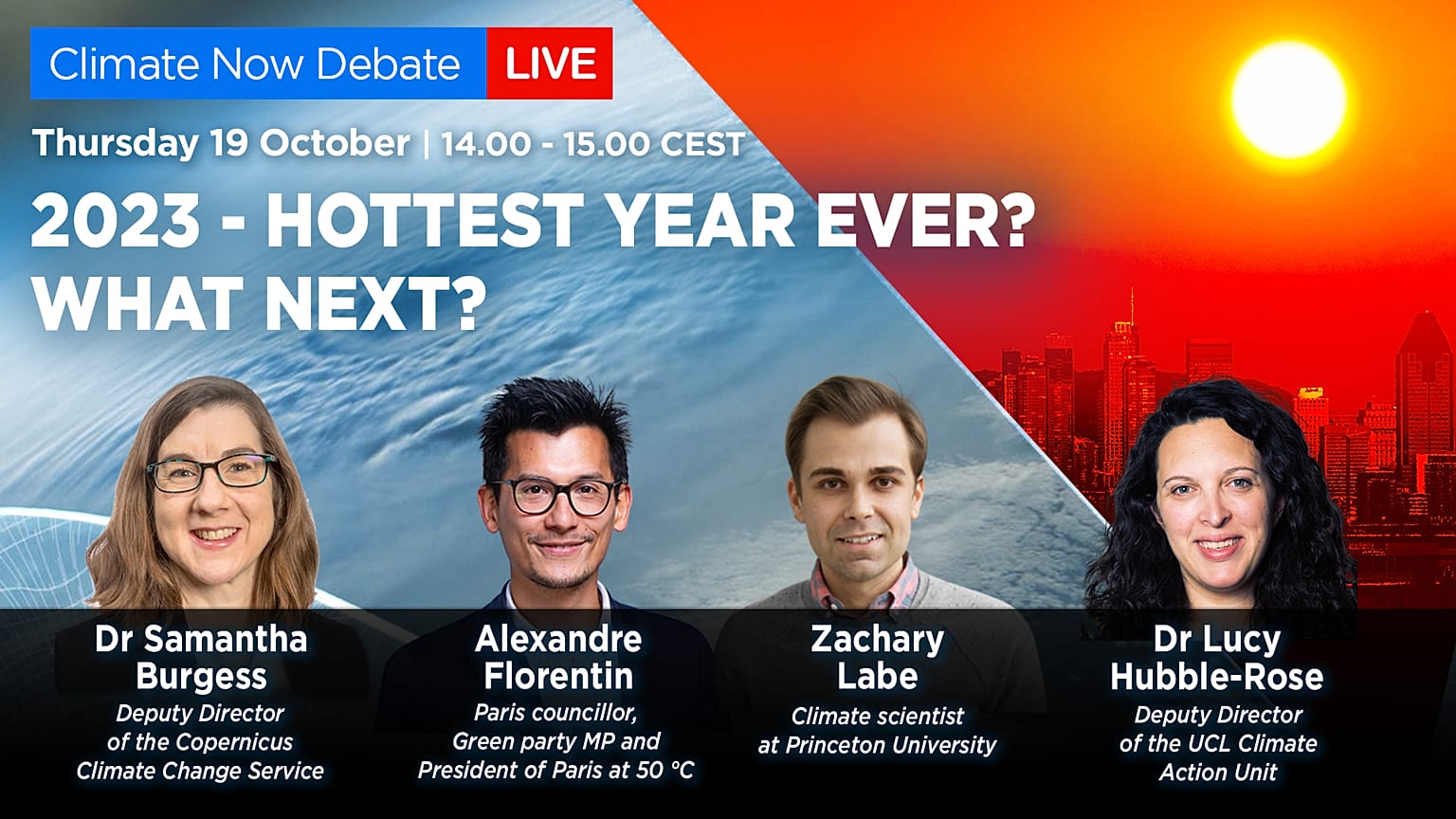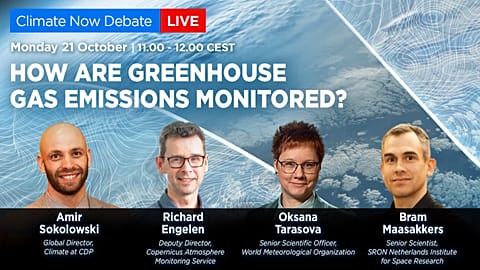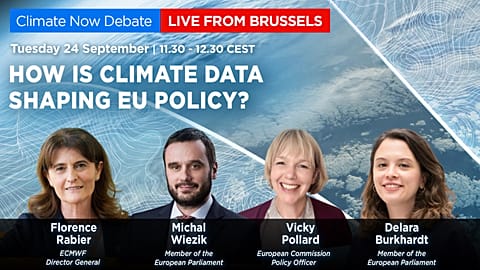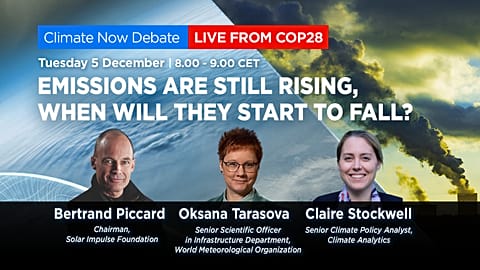Watch our expert panellists as they discuss this year’s extraordinary climate data and what action needs to be taken.
Climate scientists have confirmed that the summer of 2023 broke temperature records by a considerable margin worldwide.
 ADVERTISEMENT
ADVERTISEMENT
 ADVERTISEMENT
ADVERTISEMENT
Unless late autumn and early winter this year prove to be extremely cold, 2023 will overtake 2016 as the hottest year on record.
Euronews brought together a panel of experts for a Climate Now live debate. They delved into the details of how our planet is warming, explored the psychology of climate change adaptation, and heard examples of how to live in extreme temperatures.
Watch the full debate in the video below:
Will 2023 really be the hottest ever?
Temperatures have not abated with the arrival of autumn. September 2023 was the hottest September globally since records started in 1850.
"September 2023 was also the biggest marginal difference between any other month of any other year going back to 1940," said Samantha Burgess, Deputy Director of the European Union's Copernicus Climate Change Service.
"That was an unprecedented result."
In early October, schools in the Canary Islands were forced to close after some areas saw temperatures as high as 38C. Most classrooms don’t have air conditioning as the weather during the school year is usually milder than in 2023.
October's data show strong anomalies, being much warmer than the average period for 30 years.
"It makes me nervous about what's to come," Burgess added.
Climate scientist Zachary Labe agreed, saying the persistence of the heat and the large deviations compared to previous years are particularly surprising this year.
Global temperatures for the first eight months of 2023 are just 0.01C below 2016, so scientists predict this year will become the hottest ever.
"We can say with virtual certainty that 2023 will be the warmest year on record," Burgess said.
How can we encourage people to start acting?
Often, climate action is approached the wrong way round, Dr Lucy Hubble-Rose, Deputy Director of the UCL Climate Action Unit, explained during the debate.
The Climate Action Unit works with organisations to identify their specific problems and find solutions that include climate adaptations.
"It's more important to solve an economic problem in a way that is also helpful for climate change rather than taking a climate change action that is also helpful for the economy," Hubble-Rose said.
Similarly, within governments and councils, climate action needs to be integrated in other policymaking.
"We need to help them meet other objectives in a way that also means adapting to climate change," Hubble-Rose said. "It is much more powerful if climate adaptation is part of meeting other change goals."
For individuals, it might be a case of making a change for a different reason, such as cycling to work to save parking costs, which then works out as beneficial for the environment, too.
"It seems counterintuitive, but we find that actions drive beliefs rather than the other way round," Hubble-Rose said.
For climate scientist Labe, it's also important for researchers to be able to provide climate data in a way that is understandable and serviceable.
How can cities prepare for a hotter future?
As well as individual actions, our Climate Now live debate considered the important ways in which cities and towns should be adapting to weather changes in the future.
The panel discussed how early warning systems are vital to managing crisis situations, including evacuation plans and hospital systems for managing an influx of patients during heatwaves or flooding.
In one city, experiments are taking place to give residents a taste of what it might be like to live in a much hotter world.
Alexandre Florentin, a Green Party councillor in Paris, is part of a project studying how Paris could survive at 50C.
The Paris at 50C project aims to develop a new resilience strategy for on-the-ground action.
The proposed actions range from the thermal renovation of buildings and repainting roofs in a lighter colour to foregoing certain summer festivals and promoting swimming.
This month, the group set up a simulation exercise of how Paris residents would have to react to a heat dome hitting the city in 2032.
They took school children down into a disused railway tunnel for a few hours to show how life could be during a major heatwave.
"I've been advocating for the last three years that we should look for all the places in Paris that are naturally cool," Florentin said.
Like the tunnel, catacombs and churches could be significantly cooler spaces to use during a heatwave.
Can we rely on technology to survive in a hotter future?
Florentin has also been looking at how buildings with air conditioning, such as museums, offices and hotels, could be utilised during a heatwave.
"Are we going to share these spaces, or are they going to stay private?
"If it was up to me we would requisition them if we could," he said.
This comes with an important caveat, however, with Florian saying air conditioning units may only work up to a certain temperature limit that could be surpassed in the future.
Other technology and infrastructure are also affected by extreme heat, for example, transport rails buckling or heat-related power outages.
"The line that we can just use energy to create an artificial environment is a flawed reality," as Burgess put it.
Watch the conversation for further discussions about how to break out of climate inertia, and examples of concrete actions that both individuals and governments can take to adapt to a warmer future.
Meet our panelists:
Dr Lucy Hubble-Rose, Deputy Director of the UCL Climate Action Unit.
Dr Lucy Hubble-Rose is an expert facilitator who helps people and organisations to unpick problems associated with planning and delivering action on climate change. Following a PhD in Climate Change engagement from the University of Exeter and a Masters in Climate Change from the University of East Anglia, Lucy became fascinated by the challenges of making change happen. Her main focus is working as a core member of UCL's Climate Action Unit (CAU). The CAU works to change how scientists, policymakers, businesses, media, civil society organisations and citizens engage with each other about climate change.
Dr Zachary Labe, Climate scientist at Princeton University
Zachary Labe is a postdoctoral researcher working at NOAA Geophysical Fluid Dynamics Laboratory and the Atmospheric and Oceanic Sciences Program at Princeton University. His research intends to improve our understanding of climate variability and extreme events in a warming world. He is passionate about improving science communication, accessibility, and outreach through engaging data visualisations.
Dr Samantha Burgess, Deputy Director of the Copernicus Climate Change Service
Dr Samantha Burgess is Deputy Director of C3S, the European Union's Copernicus Climate Change Service, working to improve understanding of climate-related risks. C3S provides open access to climate data globally to inform better decision-making. Sam has previously focused on environmental resilience, sustainable finance & ocean governance in roles including chief scientific advisor & head of policy in government, business, NGOs and academia.
Alexandre Florentin, Green Party MP and President of Paris at 50C
With a double degree and five years of experience, Alexandre Florentin has developed expertise at the interface of private and public issues, between technical and political domains. Florentin is an MP with a French environmental party who is testing out whether Paris can survive at 50 degrees. As president of the Paris at 50C project, he is conducting research and experiments into concrete solutions to implement in the French capital to adapt to a warmer future. He is also co-director of the company Carbone 4 where he works with French and international companies who want to shape their business models and strategies to take climate and energy constraints into account.

















